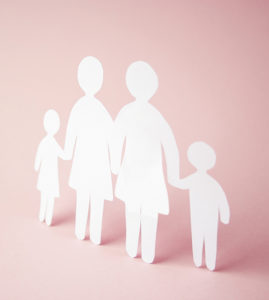Fostering Discrimination: Will SCOTUS Allow Religion to Rule in Foster Care Placement?

Like so many areas of society, the US child welfare system is feeling the effects of the novel coronavirus. A recent report by the Marshall Project sites family court closures and established foster parents wary of taking in new children as some of the ways young people in the system are being adversely affected. Imagine if some of those kids had been set up years ago in homes where they were truly wanted and had an established family structure to rely on in these trying times. Imagine if would-be foster parents hadn’t been rejected by the system for religious reasons.
Protecting the best interests of children in foster care by helping them find safe homes with loving families has always been the top priority for our country’s child welfare system. But the US Supreme Court is being asked to turn that mission on its head and instead prioritize the religious beliefs of taxpayer-funded foster care agencies that reject qualified parents who are LGBTQ or who practice the “wrong” religion.
The justices have agreed to hear Fulton v. City of Philadelphia next term, which begins in October. The case involves a faith-based foster care agency that wants the court to force Philadelphia to fund it with taxpayer dollars even though the agency violates the city’s anti-discrimination laws by refusing to work with LGBTQ parents.
Philadelphia officials stopped contracting with Catholic Social Services for foster care placement in 2018 after they learned of the agency’s discriminatory practices. Not only did the agency violate city laws and misuse religious freedom to license discrimination, but it harmed the estimated 6,000 children in Philadelphia’s foster care system by turning away eligible families and making it even harder for kids to find homes.
Rather than follow the law, the agency and four of its foster parents sued the city with the assistance of the Becket Fund for Religious Liberty. Two federal courts ruled in favor of Philadelphia and refused to make the city work with Catholic Social Services, but the agency is continuing to fight for the right to discriminate.
The agency isn’t alone in its quest: Rather than stopping foster care agencies from discriminating with taxpayer dollars, the Trump administration and several states have allowed it to happen. In January, Tennessee became the eleventh state to pass a law allowing state-authorized foster care and adoption agencies to reject parents for being LGBTQ or for adhering to the “wrong” religion. The others include Alabama, Kansas, Michigan, Mississippi, North Dakota, Oklahoma, South Carolina, South Dakota, Texas, and Virginia.
Even worse, the Trump administration last year granted South Carolina’s request for an exemption from federal anti-discrimination laws so all foster care agencies in the state can cite religion to turn away qualified parents. President Trump’s Department of Health and Human Services last fall proposed a rule that would allow this discrimination to occur at foster care agencies nationwide; it has not yet been finalized.
People aren’t letting these cruel, harmful policies go unchallenged—several federal lawsuits have been filed to stop them. One was brought by Aimee Maddonna, a South Carolina mother of three who wanted to help children in foster care. She applied to volunteer with Miracle Hill Ministries, a large, taxpayer-funded agency in her state, and was told she was a perfect fit—until the agency learned she was Catholic. Miracle Hill rejected her because she did not conform with its evangelical Protestant theology.
With the help of Americans United for Separation of Church and State, Maddonna filed a federal lawsuit last year against the Trump administration and South Carolina officials for sanctioning religious discrimination, in clear violation of the Constitution. A few months later Eden Rogers and Brandy Welch, a same-sex couple who also were rejected by Miracle Hill, filed a similar suit with help from Lambda Legal, the ACLU, and South Carolina Equality Coalition. Americans United and Lambda Legal also represent a same-sex couple in Texas, Fatma Marouf and Bryn Esplin, who wanted to foster refugee children but were turned away by a taxpayer-funded, Catholic foster care agency that objects to working with LGBTQ parents.
“Whatever you believe about religion, it has nothing to do with how suitable you are to be a parent,” Maddonna has said. “All that matters is that you are ready, willing, and able to be a bright spot in a child’s life.”
Rachel Laser, president and CEO of Americans United, urged the Supreme Court to protect children and religious freedom by upholding Philadelphia’s decision to prevent religious discrimination.
“The Supreme Court should affirm the city’s decision and make clear to all government officials that religious freedom is not a license to discriminate,” Laser said. “It’s a new low when we see religious freedom being weaponized to harm vulnerable children. Religious freedom, as promised by the Constitution, means that we are all free to practice our religion, or no religion, as we see fit, so long as we don’t harm others.”
